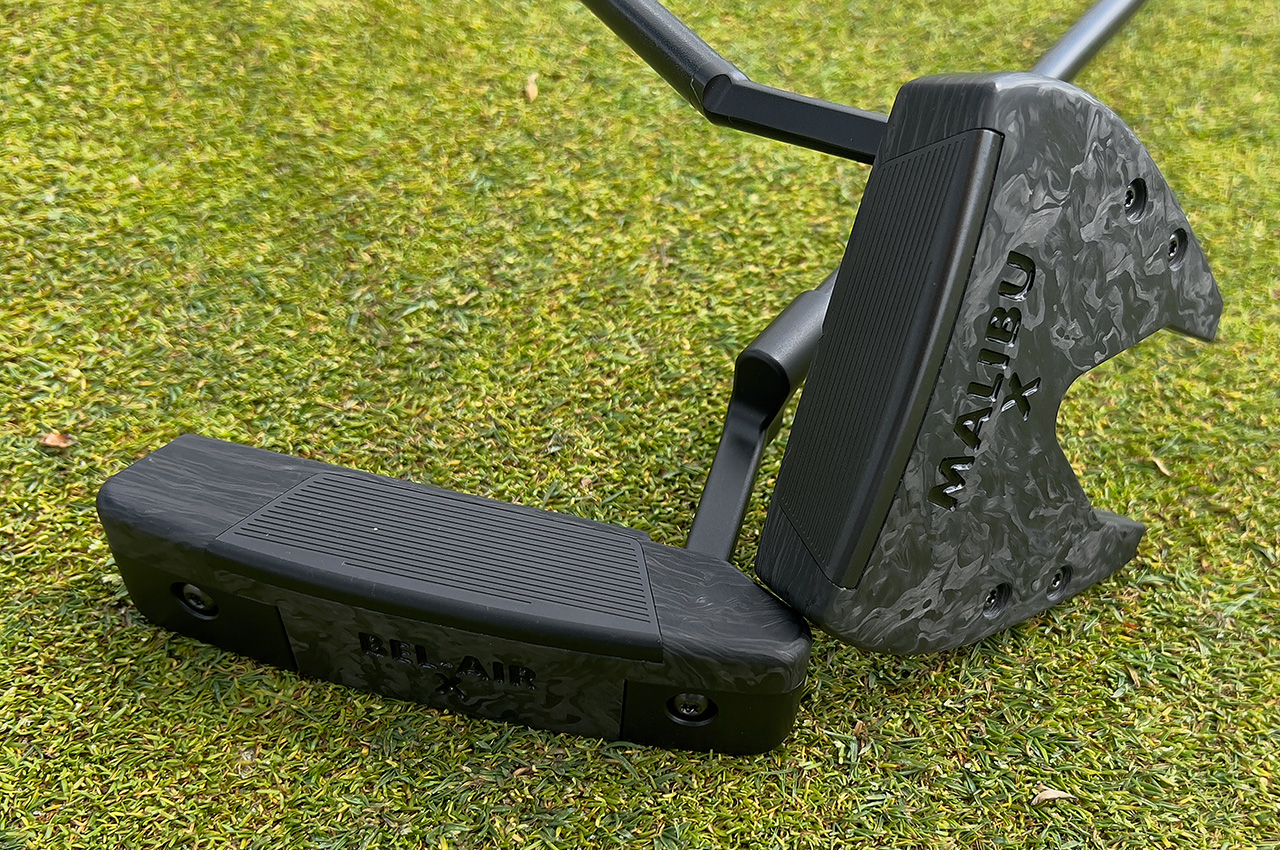Gear: LA Golf Bel-Air, Malibu putters
Price: $499 (Bel-Air, Malibu), $599 (Bel-Air X, Malibu X)
Specs: Carbon fiber heads with grooved stainless steel face inserts, tungsten weights and graphite shafts
Who it’s For: Golfers who love technology and want extreme perimeter weighting and forgiveness in a traditional-sized putter.
The Skinny: LA Golf’s Bel-Air and Malibu putter heads are made using carbon fiber instead of steel, which allowed designers to add large tungsten weights in the heel and toe for stability while a variable-loft face helps to improve the consistency of your roll.
The Deep Dive: LA Golf is an equipment company that has made a name for itself by not only making high-performance graphite shafts for woods and irons but also specializing in graphite shafts for putters. The company has also signed several well-known players as brand ambassadors, including Bryson DeChampeau, Dustin Johnson and Michelle Wie West.
Last year, LA Golf released its first club, a $1,500 blade putter that was made from carbon fiber instead of steel and that came with one of the company’s graphite shafts. At that price, the brand knew it would not sell many putters, but like a concept car, it showed what LA Golf could do. Now, with the release of its GEN 2 putters — the Bel-Air and Malibu — LA Golf is bringing the technologies it debuted last year to a broader audience.

LA Golf Malibu putter. (David Dusek/Golfweek)
It is likely that every putter you have ever used is either made from stainless steel or a combination of stainless steel, aluminum and tungsten, but LA Golf makes its putter heads using carbon fiber. In the case of the standard Bel-Air blade and Malibu mallet, the carbon fiber is compression molded, a process that involves heating the carbon fiber and pressing it into the desired shape. For the Bel-Air X and the Malibu X putters, the carbon fiber is forged into a block before getting milled into the final shape by a computer-guided bit.
In both cases, the carbon fiber is five times less dense than the stainless steel often used in putters, resulting in a huge amount of discretionary weight that can be utilized to improve performance.
Much of that weight is concentrated in a 106-gram tungsten weight in the toe and an 88-gram tungsten weight in the heel of the GEN2 putters. Those weights create extreme perimeter weighting, which enlarges the sweet spot and helps to keep the Bel-Air and the Malibu stable on off-center hits.

The LA Golf putters come standard with a P-Series SoHo shaft. (David Dusek/Golfweek)
To further help the putter resist twisting on off-center hits, each Bel-Air and Malibu putter comes fitted with an LA Golf P-Series SoHo graphite shaft. It is very stiff and designed to decrease excessive vibrations, and when combined with the perimeter weighting in the head, it should help putters roll in your intended target line more often.

LA Golf uses a grooved, descending-loft face insert in the Bel-Air and Malibu. (David Dusek/Golfweek)
Finally, both the Bel-Air and the Malibu have a grooved stainless steel face insert that has Descending Loft technology. This is a feature that came from a brand called SIK, which LA Golf purchased. There is 4 degrees of loft on the top quarter of the insert, but it decreases to 3 degrees, then 2 degrees and finally 1 degree of loft in the bottom quarter.
If you make contact with the ball and your hands are pressed slightly ahead of the putter’s head, that would ordinarily de-loft the face and result in the ball going down, into the ground, and then popping up like a chip. The extra loft at the top of the insert reduces that effect. Similarly, if your strike your putt on a rising path and in the lower portion of the face, the reduced loft helps can help keep the ball from hopping. The result is more consistency in the roll, putt after putt.

The LA Golf Bel-Air putter is still larger than most blades. (David Dusek/Golfweek)
While the GEN 2 Bel-Air has the same shape as the original LA Golf Blade putter, it is smaller. However, the club is still slightly longer from heel to toe than most blade-style putters, and larger from face to face. The fang-style Malibu mallet is also slightly larger than other mallets of its type. Both have a unique finish and look that comes from the compression and forging of the carbon fiber, so no two putters are exactly alike.

